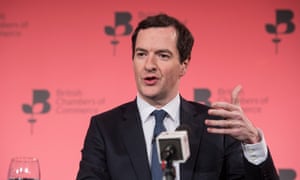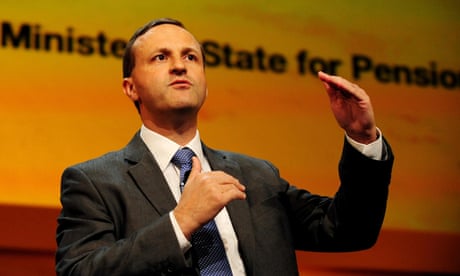Less than a fortnight before the budget, chancellor fears backlash from affluent voters against measures including cut in tax relief for higher earners
 George Osborne at the British Chambers of Commerce annual conference in London. Photograph: Lauren Hurley/PA
George Osborne at the British Chambers of Commerce annual conference in London. Photograph: Lauren Hurley/PA
George Osborne has been forced to abandon a package of pension reforms, including reducing tax relief for higher earners, amid growing concern that their introduction could have prompted a backlash from affluent voters.

£4bn raid on pension savings likely, says former Osborne adviser
Read more
With less than a fortnight to go before the budget, Treasury insiders took the rare step on Friday of ruling out changes that had been mooted. The proposals had included the more radical option of creating a “pensions Isa” that would have eliminated pension tax relief for all those in work.
Both options were set out in a consultation paper published last summer and the chancellor was due to announce his decision in the budget. But with nervousness in Conservative ranks about the changes growing, an ally of the chancellor said: “There won’t be any changes to tax relief at all in the budget. George has always been clear he wouldn’t do anything to damage saving. The pensions consultation has been open-ended, to look at how the system is working. He’s listened to what people have said and concluded that now isn’t the right time – with uncertainty in the global economy and reforms such as auto-enrolment still bedding in – to turn things on their head.”
Conservative MPs had become increasingly anxious about the planned changes, and the hit to higher earners. No 10 is known to be keen to avoid any distraction from the battle to win the EU referendum. On Saturday, Mark Garnier, a member of the Treasury select committee, said that having “two big things going on at the same time doesn’t necessarily help the arguments of either one or the other”.
“To be honest I don’t [think this is a victim of the EU referendum], this isn’t something people have been coming to me or chatting about in the tearooms of the House of Commons,” Garnier told BBC Radio 4’s Today programme. “It’s more to do with the fact that during this consultation a lot of companies have come forward and said this type of flat rate contribution is quite difficult to administer, when you look at payrolls and how you deliver it.
“It’s clearly not an insurmountable problem, but I think there is a great deal of complaint amongst smaller businesses, we’ve got auto-enrolment, and if you then add on to it a payroll issue that becomes a bit more of a problem.”
Osborne is understood to have become concerned that speculation about how he might reshape pensions in the budget had begun to run out of control, amid a growing number of speculative press reports, culminating in pensions ministerRos Altmann warning against the changes on Thursday.
Lady Altmann told the Financial Times that she feared making pensions tax-free would increase the risk that people retiring would blow their whole pension pot. “The freedom and choice reforms have put us in a place where people’s pensions can work well for them. However, tax is a natural brake on them spending their pension fund too soon,” she said.
Garnier emphasised that it was “slightly strange how the story had escalated, [Osborne] was looking at options and decided that the time is not right.” He added, however, that there was an opportunity to have a fundamental rehash of the pensions system, particularly for those in their 20s and below.
“If you look at where the problems lie, you’ve got lower-income workers, you’ve got people on different types of contracts, you’ve got people who pay no tax at all who get no tax relief, at the same time if you’re a 21- or 22-year-old and you’re not saving for your pension, it’s too far away, you’re struggling to put money aside for your mortgage.
“I think what we should have is a system that would take into account the big ticket items in your life. A 22-year-old has student debt, is trying to put some money aside for a mortgage, and at the same time we’re expecting them to put as much money as they can, as early as they can, into a pension.”
Under the current system, employees make pension contributions from their pre-tax income – so higher earners in effect receive tax relief worth 40%, but basic rate taxpayers just 20%. One option under consideration had been to replace this tiered system with a flat rate of pension tax relief, which could have benefited basic rate taxpayers, but penalised higher earners.
The more radical proposal of a pensions Isa, which Osborne saw as the culmination of his project to hand savers complete control over their retirement savings, would have removed upfront tax relief on all contributions – for both the basic and higher rate – in return for a promise that the whole pension pot could be drawn down tax-free on retirement. This idea was strongly backed by Thatcherite thinktank the Centre for Policy Studies, which has urged Osborne to stick to his guns.
The pensions Isa plan would have provided a welcome boost to Treasury coffers in the short term, by removing tax relief on pension contributions, which is estimated to cost £21bn a year. But the government would then have faced higher costs in the coming decades as users of the new system retired.
The Treasury stressed that the chancellor’s key concern was the risk of undermining workers’ incentives to save. But the retreat will be seen as a fresh blow for Osborne, who had already dropped plans for deep cuts to tax credits for the low-paid in last year’s autumn statement after a fierce backlash from the House of Lords and his own backbenchers.
Under cover of storm clouds, Osborne plans stealth tax subterfuge
Phillip Inman Economics correspondent
Read more
Mick McAteer, director of the Financial Inclusion Centre, said on Saturday that scrapping pensions reforms was a missed opportunity. He told Today: “UK households have around £4.8tn-worth of private pension wealth, the top 20% of those households own about £3.4tn of that wealth, so if you have 10 people in a room, two of those people have more than twice the pension wealth than the other eight put together.
“We have a clear inequality in our pensions system, and this is a really disappointing piece of news, because this was a great opportunity to actually make the pensions system work better for the self-employed, people on zero-hours contracts who are really facing a long-term pensions crisis. Fewer than one in five of the self-employed are currently contributing to a pension at the moment, that’s down from a figure of 60% back in the late 1990s.”
The decision will also inevitably be seen in the context of Osborne’s hopes of succeeding David Cameron as prime minister, after Boris Johnson’s decision to back Brexit cemented his appeal with grassroots Tory party members.
Osborne’s reputation as a political tactician, which he had carefully rebuilt after the “omnishambles” budget of 2012, was dented by the U-turn on tax credits. A controversial pensions policy could have underlined some Conservative backbenchers’ feeling that the chancellor has an unsure touch with their core voters.
One senior Eurosceptic backbencher said the budget was likely to “reflect a certain amount of self-inflicted political paralysis”, as the government’s energy is absorbed by running the campaign to remain in the EU. But Treasury insiders said it would still be a reforming budget.
Osborne will deliver his budget against the backdrop of a deteriorating outlook for the global economy. He has already warned that he may have to make “further reductions in spending” to meet his target of balancing the public finances by the end of the parliament in 2020.
“I’ll address that in the budget but people should know this of me: I will do what is required to keep our country safe and secure,” he told the BBC in a recent interview.




No comments:
Post a Comment